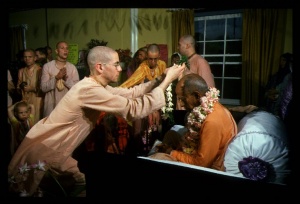SB 4.21.4: Difference between revisions
m (1 revision(s)) |
No edit summary |
||
| Line 1: | Line 1: | ||
{{info | {{info | ||
|speaker= | |speaker=Maitreya Ṛṣi | ||
|listener= | |listener=Vidura | ||
}} | }} | ||
[[Category:Srimad-Bhagavatam - Canto 04 Chapter 21|s04 ]] | |||
[[Category:Bhagavatam Verses Spoken by Maitreya Rsi - Vanisource|042104]] | |||
<div style="float:left">'''[[Srimad-Bhagavatam]] - [[SB 4|Fourth Canto]] - [[SB 4.21: Instructions by Maharaja Prthu|Chapter 21: Instructions by Mahārāja Pṛthu]]'''</div> | |||
<div style="float:right">[[File:Go-previous.png|link=SB 4.21.3]] '''[[SB 4.21.3]] - [[SB 4.21.5]]''' [[File:Go-next.png|link=SB 4.21.5]]</div> | |||
{{RandomImage}} | |||
==== TEXT 4 ==== | ==== TEXT 4 ==== | ||
<div | <div class="verse"> | ||
prajās taṁ dīpa-balibhiḥ | :prajās taṁ dīpa-balibhiḥ | ||
sambhṛtāśeṣa-maṅgalaiḥ | :sambhṛtāśeṣa-maṅgalaiḥ | ||
abhīyur mṛṣṭa-kanyāś ca | :abhīyur mṛṣṭa-kanyāś ca | ||
mṛṣṭa-kuṇḍala-maṇḍitāḥ | :mṛṣṭa-kuṇḍala-maṇḍitāḥ | ||
</div> | </div> | ||
| Line 16: | Line 22: | ||
==== SYNONYMS ==== | ==== SYNONYMS ==== | ||
<div | <div class="synonyms"> | ||
''prajāḥ''—citizens; ''tam''—to him; ''dīpa-balibhiḥ''—with lamps; ''sambhṛta''—equipped with; ''aśeṣa''—unlimited; ''maṅgalaiḥ''—auspicious articles; ''abhīyuḥ''—came forward to welcome; ''mṛṣṭa''—with beautiful bodily luster; ''kanyāḥ ca''—and unmarried girls; ''mṛṣṭa''—colliding with; ''kuṇḍala''—earrings; ''maṇḍitāḥ''—being bedecked with. | |||
</div> | </div> | ||
| Line 23: | Line 29: | ||
==== TRANSLATION ==== | ==== TRANSLATION ==== | ||
<div | <div class="translation"> | ||
As the King entered the gate of the city, all the citizens received him with many auspicious articles like lamps, flowers and yogurt. The King was also received by many beautiful unmarried girls whose bodies were bedecked with various ornaments, especially with earrings which collided with one another. | As the King entered the gate of the city, all the citizens received him with many auspicious articles like lamps, flowers and yogurt. The King was also received by many beautiful unmarried girls whose bodies were bedecked with various ornaments, especially with earrings which collided with one another. | ||
</div> | </div> | ||
| Line 30: | Line 36: | ||
==== PURPORT ==== | ==== PURPORT ==== | ||
<div | <div class="purport"> | ||
Offerings of natural products such as betel nuts, bananas, newly grown wheat, paddy, yogurt and vermillion, carried by the citizens and scattered throughout the city, are all auspicious paraphernalia, according to Vedic civilization, for receiving a prominent guest like a bridegroom, king or spiritual master. Similarly, a welcome offered by unmarried girls who are internally and externally clean and are dressed in nice garments and ornaments is also auspicious. Kumārī, or unmarried girls untouched by the hand of any member of the opposite sex, are auspicious members of society. Even today in Hindu society the most conservative families do not allow unmarried girls to go out freely or mix with boys. They are very carefully protected by their parents while unmarried, after marriage they are protected by their young husbands, and when elderly they are protected by their children. When thus protected, women as a class remain an always auspicious source of energy to man. | Offerings of natural products such as betel nuts, bananas, newly grown wheat, paddy, yogurt and vermillion, carried by the citizens and scattered throughout the city, are all auspicious paraphernalia, according to Vedic civilization, for receiving a prominent guest like a bridegroom, king or spiritual master. Similarly, a welcome offered by unmarried girls who are internally and externally clean and are dressed in nice garments and ornaments is also auspicious. ''Kumārī,'' or unmarried girls untouched by the hand of any member of the opposite sex, are auspicious members of society. Even today in Hindu society the most conservative families do not allow unmarried girls to go out freely or mix with boys. They are very carefully protected by their parents while unmarried, after marriage they are protected by their young husbands, and when elderly they are protected by their children. When thus protected, women as a class remain an always auspicious source of energy to man. | ||
</div> | </div> | ||
__NOTOC__ | |||
<div style="float:right; clear:both;">[[File:Go-previous.png|link=SB 4.21.3]] '''[[SB 4.21.3]] - [[SB 4.21.5]]''' [[File:Go-next.png|link=SB 4.21.5]]</div> | |||
__NOTOC__ | |||
__NOEDITSECTION__ | |||
Revision as of 15:01, 22 May 2021

A.C. Bhaktivedanta Swami Prabhupada
TEXT 4
- prajās taṁ dīpa-balibhiḥ
- sambhṛtāśeṣa-maṅgalaiḥ
- abhīyur mṛṣṭa-kanyāś ca
- mṛṣṭa-kuṇḍala-maṇḍitāḥ
SYNONYMS
prajāḥ—citizens; tam—to him; dīpa-balibhiḥ—with lamps; sambhṛta—equipped with; aśeṣa—unlimited; maṅgalaiḥ—auspicious articles; abhīyuḥ—came forward to welcome; mṛṣṭa—with beautiful bodily luster; kanyāḥ ca—and unmarried girls; mṛṣṭa—colliding with; kuṇḍala—earrings; maṇḍitāḥ—being bedecked with.
TRANSLATION
As the King entered the gate of the city, all the citizens received him with many auspicious articles like lamps, flowers and yogurt. The King was also received by many beautiful unmarried girls whose bodies were bedecked with various ornaments, especially with earrings which collided with one another.
PURPORT
Offerings of natural products such as betel nuts, bananas, newly grown wheat, paddy, yogurt and vermillion, carried by the citizens and scattered throughout the city, are all auspicious paraphernalia, according to Vedic civilization, for receiving a prominent guest like a bridegroom, king or spiritual master. Similarly, a welcome offered by unmarried girls who are internally and externally clean and are dressed in nice garments and ornaments is also auspicious. Kumārī, or unmarried girls untouched by the hand of any member of the opposite sex, are auspicious members of society. Even today in Hindu society the most conservative families do not allow unmarried girls to go out freely or mix with boys. They are very carefully protected by their parents while unmarried, after marriage they are protected by their young husbands, and when elderly they are protected by their children. When thus protected, women as a class remain an always auspicious source of energy to man.